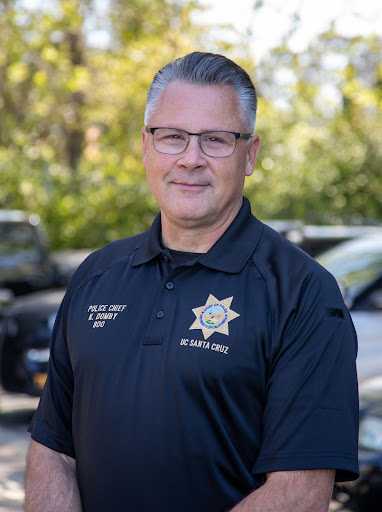UC Santa Cruz’s newly appointed Executive Director of Public Safety and Chief of Police Kevin Domby credits his high school art teacher with introducing him to the idea of a career in public service. "Throughout my career, whether it was when I was a teacher or as a peace officer, I've enjoyed mentoring, training and teaching," Domby said.
Domby grew up in southwestern Virginia, a rural area separated from the rest of the state by the Appalachian Mountains. Few high school graduates attended college and instead went to work in the coal or agricultural industries. As the first in his family to consider going to college, he faced many challenges. That dream started solidifying through the guidance of his art teacher, who had graduated from Virginia Wesleyan College (VWC), now Virginia Wesleyan University. “He drove me to Virginia Beach to visit VWC, took me to the admissions office and introduced me to faculty in the art department.”
Domby decided to follow his mentor’s path and enrolled in VWC, where he got a degree in art education and received his K-12 teaching certificate. He then pursued a master’s in fine arts at Radford University and worked as a graduate teaching assistant.
After graduating, Domby worked as an admission counselor and transfer coordinator at the Maryland Institute College of Art (MICA). He traveled the country reviewing student portfolios, providing guidance, evaluating transcripts of transfer students and making admission recommendations. “My own college experience and time working at MICA gave me invaluable insights into the challenges faced by students.”
Domby spent almost a decade teaching art, first as a high school art instructor and department chair in suburban Baltimore, Maryland. He later became an adjunct instructor and then a full-time instructor at the Baltimore County Community College (BCCC). His work at BCCC included teaching art to men incarcerated at the Jessup Correctional Facility. “The work at Jessup had a profound impact on me and opened my eyes to the life and challenges of the incarcerated.”
While teaching, he continued to pursue his personal art career. He was commissioned to create public art projects for several businesses. He participated in juried and solo art exhibits until 1999 when Domby decided to make a career change and follow in his brother’s footsteps. He joined the California Highway Patrol (CHP).
Why did you make such a significant career change?
I had reached a point in teaching where I’d achieved my goal of being a full-time college instructor, but I always admired the public service my brother was doing as a CHP officer. Over the years, during my visits with him and while riding with him during his shift, I was impacted by the essential public safety and service the CHP provided to the community. I came to want to be a part of that service and, with the support of my wife, brother, and family, began my second career, which, in a roundabout way, has led me to UCSC.
I’m tremendously excited to merge the lessons and skill sets I’ve learned in both of my careers to serve the UCSC campus.
Looking across your career with the CHP, what are you most proud of?
I pride myself on ensuring both myself and those I was in charge of leading provided service to the community that was respectful, professional, ethical and done with integrity.
I was blessed to have served in a variety of assignments where I experienced first-hand the importance of the CHP as an essential organization in the community, especially in a time of crisis, tragedy and need. “It is the individual connections with the public that I found most rewarding and important.” Those interactions don’t just happen. They are the result of a commitment to service and the profession.
What are your thoughts about how policing is carried out today and the opportunities we have for change?
Communities across the nation, including the UCSC community, deserve an approach to public safety that is always respectful, professional, accountable and responsive to the concerns and needs of the community. Earning community trust on a daily basis through a commitment to ongoing communication, collaboration and input is the way forward. The UCSC Police Department, as part of the Risk and Safety Services Unit, performs an essential service 24 hours a day ensuring UCSC is a safe place to learn, live, work, and visit.
What would you like the UCSC community to know about how you lead?
Humility is an essential part of being a leader. You've got to have an open door, an open mind and an open heart.
I am a coach/mentor leader. I enjoy working alongside people and supporting them. It’s cliche to say you lead by example, but I find participating in the work that those you're leading are doing allows you insight to help guide them or provide resources so that they can do their job better.
As someone who understands the creative process and input from all angles, I’m able to break down a problem and then identify what resources, people and processes solve it. That way, the solution is one that has been vetted by community members or the people responsible for implementing it.

